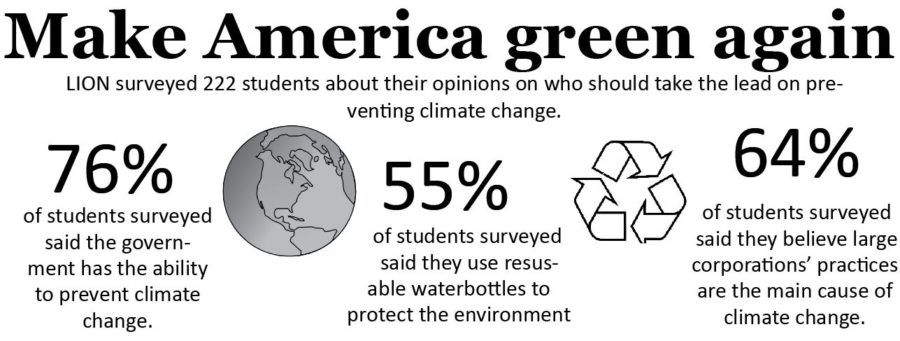Point Counterpoint Counterpoint: Stopping Climate Change (article/video)
How can we as a society address climate change? This is Point Counterpoint Counterpoint: Fixing climate change.
April 16, 2019
Scientists are generally in consensus: the Earth’s climate is changing, and it threatens to upend our lives in many ways. With the melting of the glaciers transforming our seafront—throwing huge sums of money in real estate at risk of being lost—people are asking, “how can we stop this?” With the pace of natural disasters escalating—not only in frequency but in intensity as well—people are asking, “how can we stop this?
In this issue of Point Counterpoint Counterpoint, Opinion Editor Olivia Janik and reporters Nicole Klein and Isabella Sorice discuss the Earth’s changing climate—and who in our society can have the greatest capacity to slow the pace of Climate Change. To watch their discussions on this topic, watch the video above or click here to watch it on LTTV’s YouTube account.
by Isabella Sorice
No one can argue against it- climate change is real and is affecting us every day. Whether it be ice caps melting, or flooding in the Midwest, global warming is barreling down on us, and it’s our job to prevent it from further damaging the Earth. Each individual has their responsibilities, but we need to start expanding our efforts—nationwide. There is always room for legislation that will help preserve our planet’s well-being, being in the form implementing regulations on companies.
How can the government improve our climate and how we interact with it?
From my perspective, the government has a few main areas in which they can improve global warming: controlling what types of energy we use, implementing better measures of adaptation for our changing planet, and supporting eco-friendly options.
First in legislation, our government has the power to eliminate the use of damaging energy sources, specifically fossil fuels. According to Forbes, once carbon is released into the atmosphere, it stays for hundreds of years. By allowing the country to continue using these materials as energy sources, the government is adding to the increase in temperature. With this heat, future generations will experience a completely different Earth than what we experience now. In order to promote the use of less of these fossil fuels, the government can place taxes or fees on harmful energy sources. In addition, the government should be pushing for more use of clean energy, such as wind or solar power.
Secondly, our government can improve how we handle natural disasters as the climate continues to change around us. Instead of encouraging citizens to rebuild in the same place after a fire or hurricane, they should be increasing safety precautions and making sure that homes are not built in these same, hazardous locations. Our government should also be changing safety codes to make them more strict in dangerous areas, requiring a more structurally sound building, or local government should dismiss the idea of rebuilding at all. We should be confident in our home’s ability to keep us safe from the world that is currently becoming more and more dangerous.
Furthermore, the meat industry is responsible for roughly 15 to 18 percent of all greenhouse gas emissions, passing transportation, according to Interamerican Association for Environmental Defense (AIDA). Local governments can make a difference by supporting small local producers, who, unlike large factory farms, care about land restoration and make animals and crops more resilient to climate change. The government can accomplish this by using ads for smaller companies. It’s less about everybody becoming vegetarians, but more about supporting those who produce our food with a respect for nature, which in turn, will benefit the climate by improving .
Conclusively, there are multiple ways to deal with climate change, not all necessarily trying to make it go away, which we all know is unrealistic (for the foreseeable future). The government should be focusing on preparing the whole country for a different climate and, creating new regulations that will help keep our planet from further damage.
by Nicole Klein
To many, climate change seems overwhelming and out of our control. However, individuals can actually have the biggest impact to prevent global warming.
One of the leading causes of climate change is the global livestock industry. If cattle were their own nation, they would be the world’s third largest greenhouse gas emitter, according to the National Resources Defense Council. This is because the cattle and their manure release greenhouse gases into our atmosphere. The forests that could’ve absorbed these gases are being cleared to grow food for cattle or provide land for them to live on.
Government nutritionists recommend that adults eat no more than five to six ounces of meat per day. According to Global Agriculture, it was projected that in 2018, Americans consumed around 10 ounces of meat per day, which is almost double the recommended amount. If individuals decreased their meat intake, not only would it reduce heart disease and cancer, it would decrease global warming. If Americans cut just a quarter pound of beef a week from their diets, it would be the equivalent of taking 10 million cars off the road for one year, according to the NRDC.
Everyday we make many choices that either help or harm the environment, like driving. Taking a car is often the quickest and easiest, but walking or biking is better for the environment. Each mile you choose not to drive keeps one pound of carbon pollution out of the atmosphere, according to NRDC. This can add up over time and make a large impact.
You can also decrease your carbon footprint by decreasing how much food you throw away. When you discard food, you are throwing away all the resources that went into growing and transporting it. Once in the landfill, wasted food converts into methane gas. However, if you compost the leftover food, it decomposes and significantly reduces methane gas emissions. This is better for the soil and for the environment.
While the government can help combat climate change by passing laws and creating regulations, individuals are the ones who motivate them to do that. If the government doesn’t, individuals will vote them out. Each one of our individual voices plays a large role in helping decrease climate change. Across Europe, students have been walking out of school to protest the government not doing enough to help climate change. Currently, in the case of Juliana v. United States, 21 young people are suing the Trump Administration over its inaction to fight climate change, which has violated their constitutional rights to life, liberty and property, according to The New York Times. They are hoping to secure the right to a safe and stable climate.
Even though corporations can combat climate change by using practices that are more environmentally friendly, individuals are usually what motivates them to change. Helping climate change starts with each and every one of us.
By Olivia Janik
The temperatures are rising, natural disasters are getting more severe and wildfires are causing more damage. Climate change is real and only getting worse, but every time it seems like the world has found a solution to improving our environment, politics get in the way.
There is a simple solution to keeping politics out of solving climate change and bringing the top experts in the world to the table: corporations should take the lead in solving climate change. This is the smartest way to save our earth because many of their practices have caused this issue and corporations have the leading experts in technology and innovation that could offer new solutions to one of the world’s greatest problems.
At the beginning of the 20th century corporations were deemed “captains of industry” for their innovative techniques and the change they brought to society. In our modern society the large corporations like Amazon, Google and Exxonmobil need to take charge and bring about the change that needs to happen in this country.
Companies like these three often take initiative when it comes to improving the standard of life through their products, so why shouldn’t they improve our standard of life through diverting resources to create a greener country and world? Some may argue that it is not the responsibility of corporations to combat climate change, but scientists at NASA have found evidence that there is a 95 percent chance that humans have caused activities have warmed the Earth over the last 50 years. What has changed in the past 50 years that could have caused this change?
The advancement of technology. Cars were made to go faster, cities became brighter and consumerism caused humans to produce more waste.
One of the leading causes of climate change is greenhouse gas emissions, and according to a report from the Carbon Disclosure Project, an environmental organization, 71 percent of all greenhouse gas emissions come from just 100 corporations.
Why shouldn’t we hold these companies accountable for their actions that have harmed the environment? For the most part, it is not individuals that are causing this great devastation to our earth. It is the corporations that are releasing most of the harmful gases into our air. It is the corporations who are plowing down forests to make room for their dangerous practices. It is the corporations that are slowly killing our planet.
There is no doubt in anyone’s mind that climate change is harming our world, but it can’t be the government who steps in to fix our planet. When the government becomes involved, it allows politicians, rather than scientists to make the calls about how to combat climate change. The Paris Climate Accord was a monumental step for the entire world taking a step towards a greener planet, but all it took was one election in the United States to diminish its plans. With democratic countries, governments change and so does their platform on climate change. If the world’s governments are put in charge, it is very likely that the plan will drastically change with every major election. This is not what we need to protect our planet. We need a plan with continuity made by the world’s top innovators: corporations.





















![Movie poster for '[Rec]" (2007).](https://www.lionnewspaper.com/wp-content/uploads/2023/04/rec-640x900.jpg)








